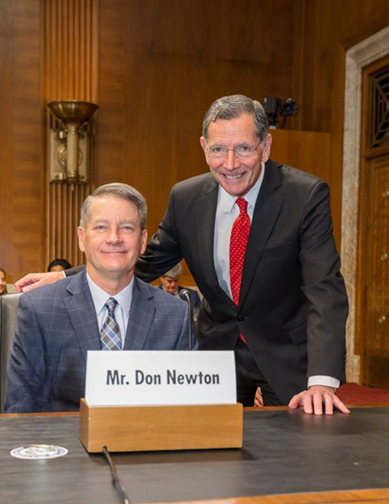
By Kimberly Mazza
CHEYENNE, Wyo. – Don Newton, the Department of Environmental Quality (DEQ) Abandoned Mine Land (AML) Division Administrator, testified before the Senate Committee on Energy and Natural Resources (ENR) in Washington D.C. today. The purpose of this hearing was to examine the implementation of federal coal mine land reclamation and abandoned coal mine land economic revitalization programs.
Ranking member of the Committee, U.S. Senator John Barrasso (R-WY) introduced Don Newton to speak on the benefits and challenges in AML funding through the reauthorization of the AML funding passed by Congress in 2021 and the new funding that was added through the Bipartisan Infrastructure Law (BIL).
Newton opened his remarks by sharing the benefits the AML Division in Wyoming provides to the state with reclamation, employment, and economic benefit. He noted that since its inception, Wyoming AML has reclaimed over 25,000 acres and closed more than 2,500 mine openings. Between 500 – 800 people are employed in Wyoming through AML reclamation projects annually.
“The reauthorization of the AML fee combined with the infusion of funding under the BIL shows a clear understanding by Congress of the need and value of the AML programs and the critical work conducted through state AML programs,” he said.
However, according to Newton, some changes should be considered for improving the AML program, which would benefit Wyoming and other states and result in better utilization of the funds provided by congress. These would include:
- The process that the Office of Surface Mining Reclamation and Enforcement (OSMRE) has established to implement the BIL program by requiring all states to update their AML Reclamation Plans and adding many new tracking metrics that do not exist in statue. “Currently, all AML States have been working under an approved Reclamation Plan for many decades. The work continues because the plans direct the work in accordance with SMCRA. Adding burdensome tracking metrics that do not exist in statue creates unnecessary and time-consuming reporting that requires additional staff and costs,” said Newton. “There is no need to add further requirements due to the additional BIL funding. Existing plans are adequate to address both the Fee-based and BIL programs.”
- A strong relationship and trust between OSMRE and the states is imperative for the successful implementation of AML Programs. Newton stated that recent changes were made by OSMRE unilaterally and with no advance notice to Wyoming or other states. “Altering agreed upon language, without giving their partners the opportunity to review and comment erodes trust and does not comply with the principles of cooperative federalism.”
- Newton expressed the support among states for The National Technical Transfer Program (NTTP). “The need for training new staff is critical, and this program provides that nationally,” he said. “Wyoming encourages OSMRE to utilize the BIL funding to employ full-time staff to support the training. This could include OSMRE hiring professional instructors instead of relying on state AML staff, which adds an unnecessary burden on already strained state programs.”
In closing, Newton added that AML programs provide great value to the environment and communities in all AML states. Wyoming runs an efficient, lean program and is always willing to participate in any efforts to improve the quality of the program.
To listen to Don Newton’s testimony, click here.
